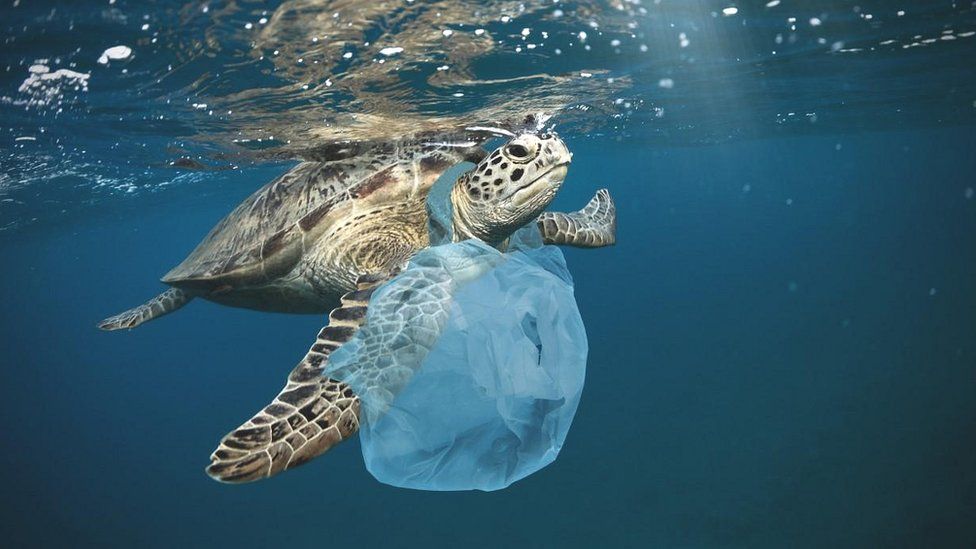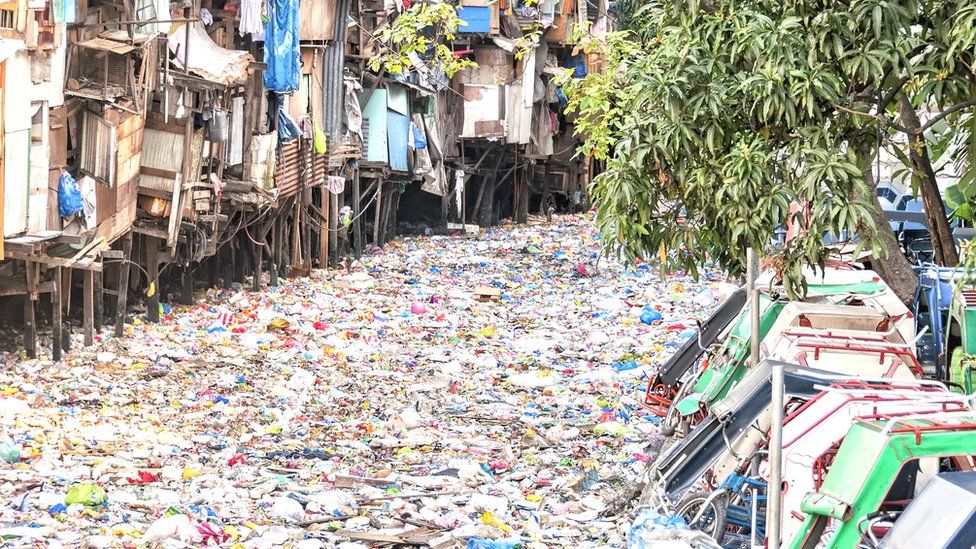
Getty Images
From BBC by Helen Briggs
An international committee will look at options for reducing plastic pollution
The world is set to get a global treaty to tackle plastic pollution.
Nearly 200 countries have agreed to start negotiations on an international agreement to take action on the "plastic crisis".
UN members are tasked with developing an over-arching framework for reducing plastic waste across the world.
There is growing concern that discarded plastic is destroying habitats, harming wildlife and contaminating the food chain.
Supporters describe the move as one of the world's most ambitious environmental actions since the 1989 Montreal Protocol, which phased out ozone-depleting substances.
They say just as climate change has the Paris Agreement, plastic should have its own binding treaty, which sets the world on course for reducing plastic waste.
Prof Steve Fletcher of the University of Portsmouth advises the United Nations Environment Programme (UNEP) on plastics issues.
He said the plastics problem spans international borders and boundaries.
"One country can't deal with plastic pollution alone, no matter how good its policies are," he said.
"We need a global agreement to enable us to deal with the widespread challenges that plastic gives us as a society."
What does this mean?
UN member states have agreed to start international negotiations on drawing up a global plastics treaty that could set rules for production, use and disposal of plastics.
The decision was made at a meeting of the UN Environment Assembly in Nairobi.
Dr Jeanne d'Arc Mujawamariya, environment minister for Rwanda, which has been at the forefront of the proposals, said they were optimistic the negotiations would put in place a framework "to end plastic pollution".
Conservation charity WWF described the decision as one of the world's most ambitious environmental actions since the 1989 Montreal Protocol, which phased out ozone-depleting substances.
Addressing the full lifecycle of plastic products - production and use, as well as disposal - is key to turning off "the plastic tap", said senior policy advisor, Paula Chin.
"The next step is to make sure all signatories are ready to deliver on the promise of this ground-breaking agreement," she added.
What happens next?
World leaders have until 2024 to agree the plastic pollution treaty, including which elements will be legally binding and how the deal will be financed.
Environmental groups are calling for clear and strong global standards that incentivise nations to stick to common rules and regulations over plastics, while penalising harmful products and practices.
There will be pressure to help countries in the global south dealing with plastic problems created in the global north.
"There is debate about who pays and how do we make sure that countries in the global south have got the resources to deal with the plastic pollution crisis that they face," said Prof Fletcher.
The UK government, which supported the resolution, described the agreement as "truly historic".
"In the space of just one human lifetime, we have caused unimaginable damage to the global environment, choking every single part of the global ocean with plastic pollution," said Lord Zac Goldsmith, government minister for international environment.
"And although there is much to be done now to turn it into an ambitious and far-reaching treaty, we can now begin to close this ugly chapter. "
Dr Jeanne d'Arc Mujawamariya, environment minister for Rwanda, which has been at the forefront of the proposals, said they were optimistic the negotiations would put in place a framework "to end plastic pollution".
Conservation charity WWF described the decision as one of the world's most ambitious environmental actions since the 1989 Montreal Protocol, which phased out ozone-depleting substances.
Addressing the full lifecycle of plastic products - production and use, as well as disposal - is key to turning off "the plastic tap", said senior policy advisor, Paula Chin.
"The next step is to make sure all signatories are ready to deliver on the promise of this ground-breaking agreement," she added.
What happens next?
World leaders have until 2024 to agree the plastic pollution treaty, including which elements will be legally binding and how the deal will be financed.
Environmental groups are calling for clear and strong global standards that incentivise nations to stick to common rules and regulations over plastics, while penalising harmful products and practices.
There will be pressure to help countries in the global south dealing with plastic problems created in the global north.
"There is debate about who pays and how do we make sure that countries in the global south have got the resources to deal with the plastic pollution crisis that they face," said Prof Fletcher.
The UK government, which supported the resolution, described the agreement as "truly historic".
"In the space of just one human lifetime, we have caused unimaginable damage to the global environment, choking every single part of the global ocean with plastic pollution," said Lord Zac Goldsmith, government minister for international environment.
"And although there is much to be done now to turn it into an ambitious and far-reaching treaty, we can now begin to close this ugly chapter. "

Plastic takes hundreds of years to degrade
Getty images
Facts on plastic:
It's thought more than five trillion pieces of plastic are in the world's oceans, which can take years to break down.
Each year, 400 million tonnes of plastic is produced and 40% of that is single-use - plastic only used once before it's thrown away
More than eight million tonnes of plastic enters the world's oceans each year and most of that escapes from land
Not all plastic can be recycled, either because of the way it's made or because it's too expensive or difficult to do so
Animals on land or at sea can be harmed by plastic.
More than eight million tonnes of plastic enters the world's oceans each year and most of that escapes from land
Not all plastic can be recycled, either because of the way it's made or because it's too expensive or difficult to do so
Animals on land or at sea can be harmed by plastic.
They can get trapped in carrier bags or food packaging or mistake plastic for food.
Links :
No comments:
Post a Comment